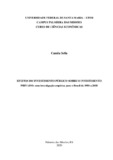| dc.contributor.advisor | Carvalho, Vinicius Spirandelli | |
| dc.creator | Sella, Camila | |
| dc.date.accessioned | 2020-10-14T11:14:39Z | |
| dc.date.available | 2020-10-14T11:14:39Z | |
| dc.date.issued | 2020-09-21 | |
| dc.date.submitted | 2020 | |
| dc.identifier.uri | http://repositorio.ufsm.br/handle/1/20086 | |
| dc.description | Trabalho de conclusão de curso (graduação) – Universidade Federal de Santa Maria, Centro de Tecnologia, Curso de Ciências Econômicas, RS, 2020. | por |
| dc.description.abstract | The present work intends to differentiate the effects that public investment can have on private investments, and thus be able to understand its impact on the economy. First, investment and some of its theories will be presented, then the different definitions of the terms crowding out are presented, which is a negative effect promoted by public investment and the crowding in that produces a positive effect on private investments. During the work, the public sector's net debt is also highlighted. The need for public sector financing is directly related to public debt. The empirical analysis presents the variables of interest, in order to carry out the analysis of descriptive statistics. For a country's economy to develop, it is necessary for the public sector to make adequate investments, be they in infrastructure, health and education. For the
government to make these investments and increase the country's economic growth, it needs the taxes collected. The government needs to control interest rates and inflation to stabilize the economy and make private investments feasible, given that high interest rates cause a fall in investments and an increase in public debt. | eng |
| dc.language | por | por |
| dc.publisher | Universidade Federal de Santa Maria | por |
| dc.rights | Acesso Aberto | por |
| dc.rights | Attribution-NonCommercial-NoDerivatives 4.0 International | * |
| dc.rights.uri | http://creativecommons.org/licenses/by-nc-nd/4.0/ | * |
| dc.subject | Investimento público | por |
| dc.subject | Crowding in | por |
| dc.subject | Crowding out | por |
| dc.subject | Public investment | eng |
| dc.subject | Crowding in | eng |
| dc.subject | Crowding out | eng |
| dc.title | Efeitos do investimento público sobre o investimento privado: uma investigação empírica para o Brasil de 1980 a 2018 | por |
| dc.title.alternative | Public investment effects on private investment: an empirical investigation for Brazil from 1980 to 2018 | eng |
| dc.type | Trabalho de Conclusão de Curso de Graduação | por |
| dc.degree.local | Palmeira das Missões, RS, Brasil. | por |
| dc.degree.graduation | Curso de Ciências Econômicas. | por |
| dc.description.resumo | O presente trabalho pretende diferenciar os efeitos que o investimento público pode causar nos investimentos privados, e assim poder compreender o impacto deste na economia. Primeiramente será apresentado o que é o investimento e algumas de suas teorias, logo após se apresenta as diferentes definições dos termos crowding out que é um efeito negativo promovido pelo investimento público e o crowding in que produz um efeito positivo sobre os investimentos privados. No decorrer do trabalho é destacada também a dívida líquida do setor público. A necessidade de financiamento do setor público está diretamente relacionada com o endividamento público. A análise empírica apresenta as variáveis de interesse, para assim realizar a análise de estatísticas descritivas. Para a economia de um país se desenvolver, é preciso que o setor público realize investimentos adequados, sejam eles em infraestrutura, saúde e educação. Para o governo realizar esses investimentos e elevar o crescimento econômico do país, ele necessita dos impostos arrecadados. O governo precisa controlar a taxa de juros e a inflação para estabilizar a economia e viabilizar os investimentos privados, dado que os juros altos causam uma queda nos investimentos e aumento no endividamento público. | por |
| dc.publisher.country | Brasil | por |
| dc.publisher.initials | UFSM | por |
| dc.subject.cnpq | CNPQ::CIENCIAS SOCIAIS APLICADAS::ECONOMIA | por |
| dc.publisher.unidade | UFSM Palmeira das Missões | por |



